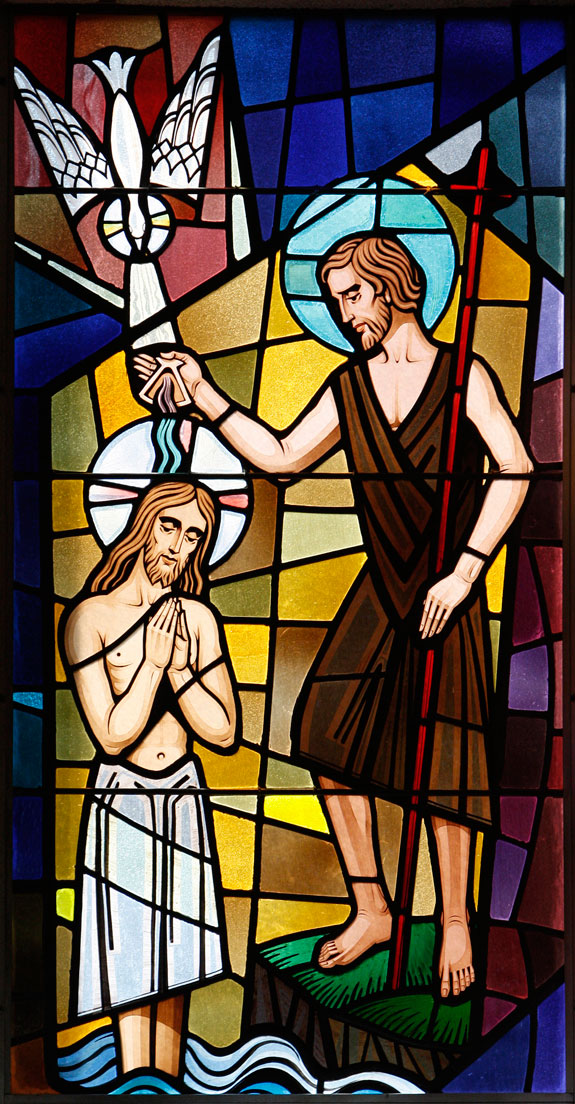Msgr. Joseph Calise

MICHAEL YORK gave one of his most brilliant performances as John the Baptist in Franco Zeffirelli’s film, “Jesus of Nazareth.” He showed the strength, determination and power of the prophet who prepared the way for Christ’s coming.
In the few times we actually hear of him in Scripture, John leaps in his mother’s womb, feeds on locusts and wild honey while dressed in camel hair, points out Jesus as the One who was to come and suffers martyrdom for refusing to compromise his principles. And for all of this, Jesus refers to him by saying that “no one born of woman is greater.”
John is certainly one of the most powerful and dynamic figures in Scripture, despite the fact that he is present only at the beginning of Jesus’ ministry. He knew his vocation in life. So as the precursor to the Messiah, it is not surprising that he is surprised when Jesus comes requesting to be baptized by him. It is also not surprising that when Jesus says to let it be this way, John does not argue. He simply lowers Jesus into the water.
The question for us is not: “Why did John baptize Jesus?” He was being an obedient servant in the presence of One greater. The question for us is: “Why did Jesus consider it necessary to be baptized?”
After all, understanding the Baptism of Jesus may give us insight into the baptism we share. Jesus explains His request by saying that it is necessary for the fulfillment of all God’s demands. God wanted at this moment to shed light on Who it was that entered the waters. With the Spirit hovering in the form of a dove, Jesus is revealed as the Beloved Son on Whom the Father’s favor rests.
So the voice of the Father, the presence of the Son and the hovering of the Spirit reveal the presence of the Trinity in our human experience. Making it known that Jesus is the visible presence of the Almighty, His human mission can begin.
The prophet Isaiah announces that this mission would be one of service – service that ultimately would lead to the cross. In today’s selection from the Acts of the Apostles, St. Peter tells Cornelius that it was because of the work Jesus did that He came to be recognized as the Lord of all. In doing good works, St. Peter says, “God was with Him.” The juxtaposition of the prophesy of Isaiah and proclamation of the Father teaches us that divine Sonship is manifested in service and that service brings with it the promise of Sonship.
Obviously, this cannot be the end of the story. It was not the waters of the Jordan River that made Jesus holy but rather Jesus Who made the waters holy – waters that in turn make holy all whom are baptized.
In a 1997 homily on this feast, Pope John Paul II preached: “Baptism frees man from original sin and forgives his sins, saves him from slavery to evil and is a sign of his rebirth in the Holy Spirit; it imparts to him a new life, which is participation in the life of God the Father, Only-Begotten Son who became man, died and rose again.”
We believe that God is with us. In baptism, we are reborn into the knowledge that His presence is a personal call to believe and to follow. Through baptism, we share the “beloved sonship” of Jesus. Therefore, we share that same call to service, to doing good – mindful that each moment we walk in the presence of the power of God.[hr]
Readings for the Feast of the Baptism of the Lord
Isaiah 42: 1-4, 6-7
Psalm 29: 1-2, 3-4, 3, 9-10
Acts 10: 34-38
Matthew 3: 13-17[hr]
Msgr. Joseph Calise is the pastor of Our Lady of Mount Carmel parish, Williamsburg.
